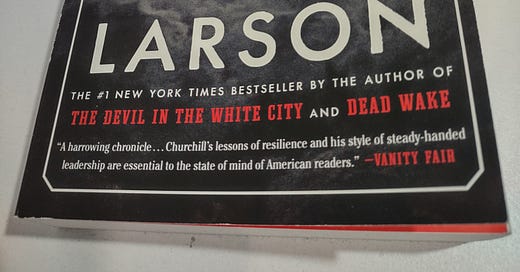Winston Churchill had many official duties as prime minister, but one of his more important tasks was not legally mandated. As other European nations fell to the Nazis, Churchill had to convince the British public that they could prevail against the threat of fascism—he needed to keep hope alive, no matter how relentlessly Hitler’s forces attacked.
In The Splendid and the Vile, Erik Larson zeroes in on Churchill’s first year in office, a year in which the fate of Britain was at its most precarious.
It’s easy to look back now, with our all-knowing hindsight, and reassure ourselves that of course Britain would endure and the Allies would ultimately defeat the Nazis. Of course the good guys would win. But the British public living in 1940 had no such assurances, especially after France surrendered. Morale could not be taken for granted.
Early in the book, Larson notes how Major General Hastings “Pug” Ismay “was struck by just how much the public seemed to need this new prime minister.”
After receiving enthusiastic well-wishes from passersby on the street, Churchill said, “Poor, poor, poor people. They trust me, and I can give them nothing but disaster for quite some time.”
Larson includes excerpts from Churchill’s notable speeches that year; his words managed to inspire even while making it perfectly clear that the fate of civilization was at stake. A good example is the “Finest Hour” speech delivered to the House of Commons on June 18, 1940:
“If we can stand up to [Hitler], all Europe may be free, and the life of the world may move forward into broad, sunlit uplands; but if we fail then the whole world, including the United States, and all that we have known and cared for, will sink into the abyss of a new dark age made more sinister, and perhaps more prolonged, by the lights of a perverted science.”
Note the inclusion of the United States. Churchill’s political courtship of President Franklin D. Roosevelt is a recurring thread throughout the book. As Churchill inspired hope among the British population, he pinned his own hopes on recruiting America’s aid in the war effort. He knew that without U.S. involvement, Britain would have little chance of victory.
But he also knew that he had no guarantee of receiving that aid, as plenty of Americans preferred to avoid intervening in foreign conflicts.
“Though sympathetic, Roosevelt remained hamstrung by neutrality laws and isolationist bent of the American public,” Larson writes.
The 1941 Lend-Lease Act allowed the United States to provide some initial support while retaining the appearance of neutrality, though even that bill’s success was far from inevitable. A March 1941 Gallup Poll showed that 55 percent of Americans supported the bill, down from the 58 percent who had expressed support in the previous poll.
“This bill has to pass,” Churchill said, as quoted by Larson. “What a state it would leave all of us in if it doesn’t; what a state it would leave the President in; what a failure he would appear before history if this bill is not passed.”
Later that year, the news of Pearl Harbor invigorated Churchill.
As Larson describes, “Churchill, his depression suddenly lifted, slammed the top of the radio down and leapt to his feet.” He was ready to declare war against Japan on the spot, until American ambassador John Winant reminded him that he couldn’t base a war declaration on a news broadcast.
Over the phone, Roosevelt confirmed the attack and his intent to declare war on Japan. Churchill briefly worried that the United States would fight only Japan, but when Hitler declared war on the U.S. on December 11, America’s full involvement was assured.
Churchill wrote, “Being saturated and satiated with emotion and sensation, I went to bed and slept the sleep of the saved and thankful.”
The Splendid and the Vile is as close to a novel as a nonfiction history book can get. Larson paints a vivid picture of Churchill and everyone in his orbit, showing the humanity that stood up to the Nazis.






Excellent novel!